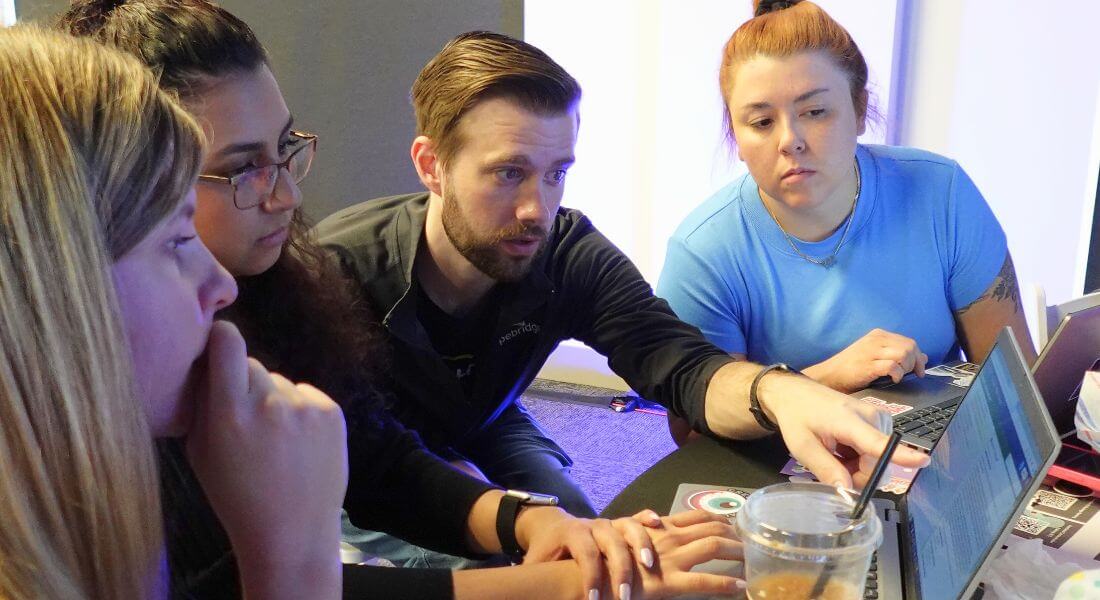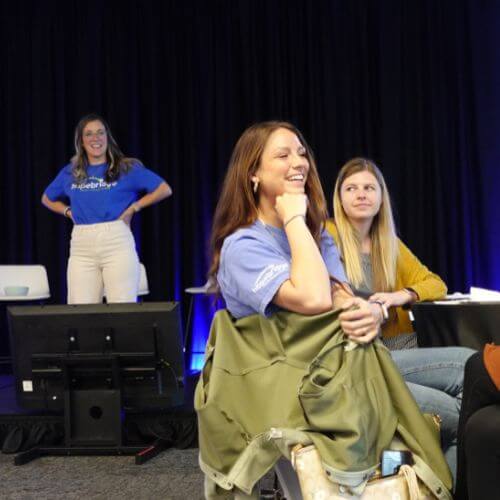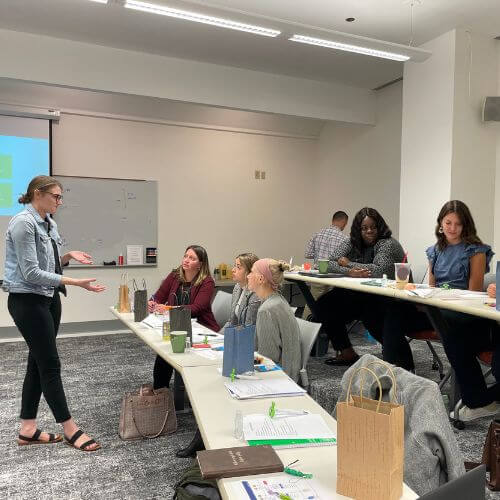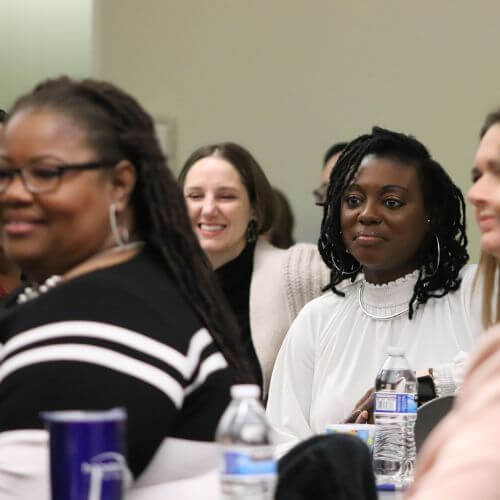Autism Therapy Clinicians and Families Benefit from Grand Rounds at Hopebridge
April 29, 2024
April 29, 2024

Those in the medical field – as well as those who watch “Grey’s Anatomy” or “The Good Doctor” – are likely familiar with the concept of grand rounds. For those who may not have this “insider” knowledge, we’ll give you the scoop. Not to be confused with daily “rounds,” clinicians use grand rounds to present challenging patient cases to an audience of experts as a way to collaborate, train junior colleagues and increase learning in areas that may fall outside of their core practices.
While traditionally reserved for the medical industry, the concept of grand rounds can have a major impact on treatment and education in other areas of healthcare as well. Hopebridge has its own version of grand rounds that has helped our team bring a higher quality of care to children with autism spectrum disorder (ASD) and other developmental delays for many years. Our clinical leadership team recently updated the grand rounds practice to provide even more value to our children, their families and their clinicians.
“We received feedback from our BCBAs that our original grand rounds presentations were good, conceptually strong resources, but that we could do more with them. As a leadership team, we aligned with the same intentions and with a more effective process that provides individualized support, in addition to expert consultation,” said Hopebridge Chief Clinical Officer Jana Sarno.
At Hopebridge, this process consists of an interdisciplinary clinical review team designed to assist our board certified behavior analysts (BCBA), occupational therapists and speech-language pathologists who require extra support for specific patient programs.
There are a myriad of ways grand rounds cases are identified for review. A senior-level clinician can submit a referral or a regional BCBA may initiate a case they think could benefit from additional support. We can also run reports to use data to identify specific patients who are likely to need higher support.
Cases that are identified as high-risk are often appropriate for grand rounds. For instance, patients with severe challenging behaviors that put them at risk of could have their case presented at grand rounds. The risk of an insurance company declining authorization for services due to a lack of progress in gaining skills is another good reason to refer a case to grand rounds. Another case may be referred to ensure that our team is acting within scope and with appropriate resources for a child who has additional medical complications.
Once submitted, Hopebridge Clinical Director of Functional Assessment and Treatment Taylor Thomas processes and selects cases. She then connects with the referring clinician to gather more patient information to prepare them for the initial case review.
Before a case is taken to grand rounds, the team works to gather and share the data and expertise necessary to provide clinical recommendations. Rather than spending time digging through action items, clinicians prepare everything in advance so they can use the presentation time wisely with consultants to go through the case and determine next steps.
Once cases are selected, the requesting board certified behavior analyst (BCBA) or therapist participates, who may also be joined by their center manager, fellows, regional BCBA, registered behavior technicians (RBT) and/or any other therapists involved in the child’s care team.
Grand rounds are conducted virtually, which allows us to hand-select the most qualified experts to serve as assets to the therapy team. Participating professionals may include Hopebridge psychologists, clinical leadership and BCBAs at the doctoral level (BCBA-D). Social workers, pediatricians, nurse practitioners or other physicians may be consulted if we need to refer to experts in those areas. We also bring in someone from Hopebridge’s compliance team to ensure safety in our centers and provide guidance around whether recommendations are in accordance with our policies and procedures.
“This curated group gives our kids the best possible support. A smaller, more focused group gives us more time to dive into the details that matter for each specific child, plus maximize our time with them in mind,” said Taylor.
Caregivers are informed when their child’s case is discussed. They do not typically sit in on the larger grand rounds presentation, however they are involved in more individualized discussions, depending on the recommendations and outcome.
Before diving in, Taylor and the consultants first review the patient’s autism diagnosis, possible comorbid diagnoses, the reason for referral, current medications that could play a factor, and all other relevant information about the patient.
Rather than a set schedule, Hopebridge accepts submissions on an ongoing basis and the new grand rounds format holds presentations as needed. In addition to formal presentations with the consultants, there are multiple occasions for one-on-one discussions—both at the beginning and as follow-up support. More importantly, the current process puts an even larger emphasis around prevention by intervening early and starting with individualized conversations and recommendations.
“We work intensively to first support the team locally by offering individualized support and recommendations, then we determine whether taking the case to the full grand rounds is appropriate,” said Taylor.
Whichever route they take, Taylor and the other grand rounds consultants continue to provide support to the case until they feel that level of support is no longer needed. The type of support and how much is needed is all based on the presenting concern, but always includes onboarding and offboarding. The objective is for the clinician and patient to be successful with help from their localized resources before the process is finished.
A full grand rounds case review typically lasts about an hour. The group will review the presentation and identify initial action items, such as real opportunities for independence (ROI), different types of assessments and documentation. Then, they will identify the level of support for the child moving forward.
Especially cases that involve the risk of self-injury or aggression, clinical recommendations could include conducting Practical Functional Assessment (PFA) and Skill-Based Treatment (SBT). Since these types of progressive care topics may not be covered in the typical ABA education, Hopebridge offers training for its clinicians in these specific areas.
“These cohorts are in response to our field that is asking for additional training; this also serves as capacity-building. If we know a majority of grand rounds referrals come to us due to the presentation of severe challenging behaviors, let’s give people a head-start in expanding their knowledge and implementing some of these procedures earlier. They can acquire more skills before they require more advanced levels of support,” said Jana.
Taylor added, “Ultimately, our goal is to prevent severe challenging behaviors from occurring. We are aiming to get our clinicians the right training and support early so it hopefully never escalates to the point where they need the full grand rounds support.”
When it comes time for offboarding, feedback is also a key part of the grand rounds process.
“Feedback got us here and will continue to carry us. We want to be responsive to the needs of our clinicians and children,” said Jana. “The current grand rounds format was generated from specific feedback, so we have formalized the opportunity to provide feedback so we can continue in the right direction for our clinicians and families.”
How does grand rounds set Hopebridge apart from other autism therapy centers?
“With many providers, kids receive support from one or two clinicians. At Hopebridge, one BCBA is wonderful, having access to a regional BCBA and other leadership is even better, but once a case is referred to grand rounds, then we have endless options for the type of experts and clinicians who can speak to it,” said Taylor. “By providing more access to different clinicians, we’re increasing the likelihood of success.”
Our large network of professionals across the nation provides our therapy teams with access to experts in the field with whom they may not normally have the opportunity to work alongside. They can collaborate with each other for additional recommendations and to assist in analyzing data and information in fresh ways.
“The Hopebridge approach to care has always focused on treating the whole child – not simply a diagnosis – which is why our programming combines complementary therapies,” said Hopebridge Vice President of Quality Assurance Melissa Chevalier. “In the same realm, we participate in grand rounds as a way to view the bigger picture.”
Grand rounds are used to review cases that need more support, often due to challenges far more complex than those surrounding social skills or repetitive behaviors.
For instance, soon after becoming a BCBA in 2023, Anna Wilson took on a new caseload that included a child with self-injurious behavior, intense tantrums and aggression that included scratching and attempts to bite. Tantrums often included flopping and head-banging, which could occur for close to an hour.
“I spent a lot of time trying to figure out who this kid is, as well as his behaviors and antecedents,” said Anna. “I am comfortable working through tantrums with children, but it broke my heart to watch him go through it so intensely, so I was glad to refer him as a candidate for grand rounds resources.”
Less than a month after the referral, Taylor came from Florida to North Carolina to support Anna on site. As a result of the grand rounds process, they conducted the interview-informed synthesized contingency analysis (IISCA) together and immediately implemented SBT.
“I had already started in the process of honoring his communication. When my regional BCBA first introduced me to HRE and the work of Dr. Hanley, that is when I really dug into SBT,” said Anna. “I felt like I had a good basis of where to start with this kiddo, but a in the right direction and affirming me with resources to implement it in a much more systematic way helped me build confidence in my clinical work.”
By teaching functional communication and the delayed tolerance of demands, tantrums have significantly decreased, plus this child gained the skills to deescalate much more quickly, keeping it a safe situation for everyone involved. He has not participated in self-injurious behaviors or intense tantrums in months.
Through SBT, he was also starting to play and engage socially with peers. He can choose to share with friends or tell his team he is “all done” if he is not into it at the moment. He began using his words to communicate and learned to ask for wagon rides, his blanket and “squeezes” when he needs more support. His mom has also reported the same behaviors at home.
“Now he seeks attention from us and we get to see more of his fun, silly behaviors. Getting to see him as his most authentic self has been the most rewarding piece of this,” said Anna. “It’s encouraging to be able to give him the tools to tell us what he’s feeling and what he needs. A lot of adults don’t know how to do this!”
For Anna, the outcomes have been so positive that her referral never made it to the full grand rounds presentation—it didn’t need to. Frequent one-on-one conversations with Taylor, Regional BCBA Khloe Mossman and Regional Director of Psychological Services Dr. Ruth Bernstein provided her and the family with the support they needed to give this child the opportunity to thrive. Because of this process, this child and family now have a greater chance for safety and independence, as well as the confidence to back it up.
“I never imagined the relationship I could have with him and his family. It’s truly a blessing and I feel grateful to be a part of his journey. This is why we do what we do,” said Anna.
Want to expand your own knowledge while improving programming for the children you serve? Anna urges other clinicians not to waste time in seeking support, especially when it comes to children with severe challenging behaviors. She encourages new BCBAs to take advantage of the resources that are provided to them.

“I had the benefit of being a new and eager BCBA, but never be afraid to ask questions and seek more support,” Anna urges other clinicians. “It’s great knowing that I’m doing everything I can, but there are also people here at Hopebridge who have more experience, or read research articles I haven’t gotten to yet. It’s always good to have fresh eyes on a case instead of getting discouraged.”
Grand rounds is just one of the many opportunities available to our employees for career growth and development at Hopebridge, from the Fellowship Program, to the BCBA Career Pathway, to free CEU opportunities from in-house thought leaders. A benefit to new and seasoned team members – as well as the children and families we serve – the extra support from initiatives like grand rounds is often mentioned as one of the top perks of the job from our BCBAs.
If learning and collaboration experiences like grand rounds sound interesting to you, consider joining our team. Check out our open positions in autism therapy centers across the country to continue to build your career with Hopebridge.
*Informed consent was obtained from the participants in this article. This information should not be captured and reused without express permission from Hopebridge, LLC. Testimonials are solicited as part of an open casting call process for testimonials from former client caregivers. Hopebridge does not permit clinical employees to solicit or use testimonials about therapeutic services received from current clients (Ethics Code for Behavior Analysts 5.07-5.08; BACB, 2020). Hopebridge does not provide any incentives, compensation, or renumeration for testimonials provided by a former client or client caregiver.